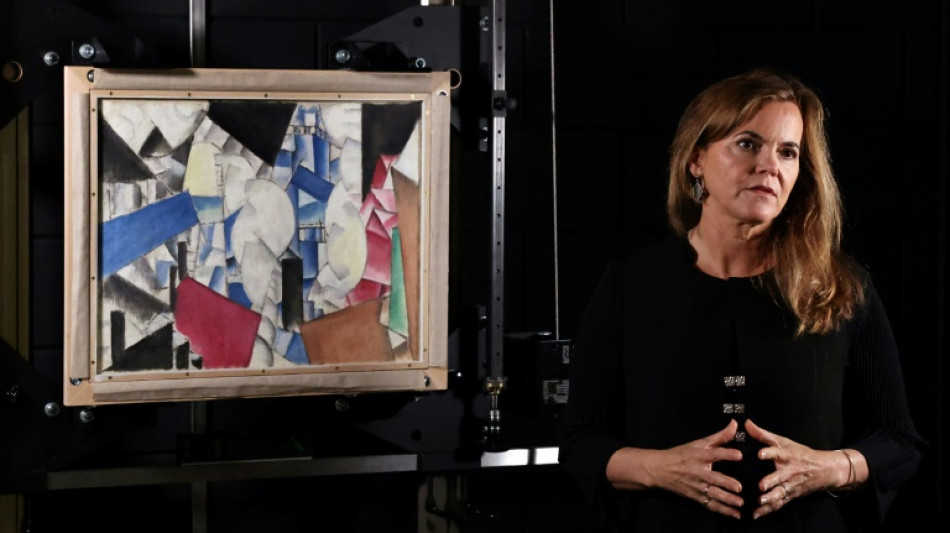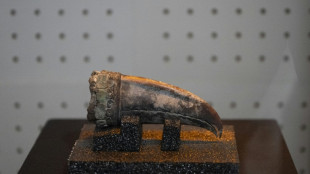

Lost Cubist painting by Leger found on back of another canvas
Art experts in the Netherlands said Thursday they had discovered an important painting by the French Cubist Fernand Leger that had been hidden for more than a century on the back of another canvas.
The unknown work "Smoke over the Rooftops", believed to date from 1911-12, was on the flip-side of "Bastille Day", made a year later, according to conservation specialists Studio Redivivus.
Partially damaged and covered with a hard glue-like layer during its lost years, it has now been painstakingly restored and reveals a "turning point" in the work of Leger, a Paris contemporary of Picasso.
"It really is a discovery," Gwendolyn Boeve-Jones, director of the Hague-based Studio Redivivus, told AFP.
The work is believed to be part of a series in which Leger painted the view from his studio of the Paris skyline towards Notre Dame, repeatedly focusing on the smoking chimneys.
Dutch art historian Sjraar van Heugten said only seven from the series were previously known to still exist, and the new work shows "hugely important" advances in Leger's use of colour and abstraction.
The story of the lost Leger begins around 110 years ago when the artist (1881-1955) gave the "Bastille Day" painting to his friend Marc Duchene as a wedding present in 1912 or 1913.
But Duchene was killed in World War I, and while the painting stayed in his family the "sad memories" meant it was never displayed and "remained unknown for years", Van Heugten said.
- 'Looks amazing' -
"Bastille Day" was then bought from Duchene's heirs in 1999 by the Triton Collection, a private art foundation that still owns the painting.
It found there had been some kind of restoration on the back, probably during the 1990s, but it was unknown exactly when and by whom -- and in any case, it had merely caused further damage.
The mystery of what exactly was on the back remained largely intact, even as "Bastille Day" was shown in several galleries.
"It was covered to a large degree with a white-grey material and the collectors had been told it was nothing really to worry about, it's not important," said Boeve-Jones.
A backing board also obscured the image.
But the enigma continued to intrigue Boeve-Jones, who moved to the Netherlands from the United States to work at Amsterdam's Rijksmuseum before setting up her own studio.
"When I was doing a condition check... I saw some of this which was exposed, and I thought wow, that looks amazing," said Boeve-Jones.
In 2016 the owners asked her to inspect further and Boeve-Jones, who says she has "known Leger my whole life", turned detective by poring over the internet and through art publications.
The removal of the glue-like stuff then made it easier to see the distinctive forms and colours beneath, especially the billowing smoke.
"It wasn't that difficult to see that it belonged in some way to the Fumees Sur Les Toits (Smoke over the Rooftops) series," she said.
- 'Wonderful painting' -
High-tech imaging techniques looking at the layers of paint and at damage from the frame then allowed her team to restore the painting to its former glory.
The painting's significance quickly emerged, placing it as a "huge leap" from Leger's darker earlier work to the more abstract and colourful style that the series pioneered.
"It's not just that the painting was covered up, that's interesting to a degree -- but what we've found is the role that this must have played in his journey," said Boeve-Jones.
Experts were sure that it was a genuine Leger due to the provenance, to the brushwork and even the 'stretcher' of the canvas that has his signature on.
"This says Leger all over it," she said.
Van Heugten, previously head of collections at the Van Gogh Museum in Amsterdam, said he was "very surprised by the quality" of a work once feared "hopelessly damaged."
"It's a wonderful painting and I'm very glad the restoration was so successful," he said.
The newly-discovered painting goes on display at the Kroller-Muller Museum in the central Netherlands as part of an exhibition on the rooftop series from 19 November until April 2.
It will be displayed in a glass cabinet that will allow viewers to see both sides.
B.Diederich--LiLuX



